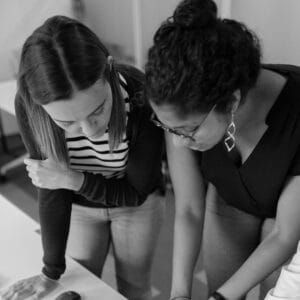Building Behavioral Design Capacity in Financial Health
Financial capability organizations provide an invaluable service to the communities they serve. They support their clients’ savings goals and help them access much-needed capital. But they also face a variety of behavioral challenges when designing effective products and services and helping clients follow through on financial goals. For example, microlenders help people who wouldn’t otherwise be able to access funding and often provide counseling services, but they run the risk of receiving late payments from borrowers, resulting in fees that borrowers may not be able to afford. These fees can trigger outsized financial crises of the sort microlenders were hoping to solve in the first place. In another example, housing programs provide an affordable place to live for many people, but they often struggle to prompt their residents to pay their rent on time, risking resident default and foreclosure. The enormous consequences of common human behaviors like missing payments and our tendency to avoid tasks we think of as hassles may make light-touch, low-cost interventions seem insufficient. However, our work in consumer finance shows they’re not.
In fact, light-touch, low-cost interventions can have an outsized impact on human behaviors and outcomes. At Accion Texas, simple reminders about upcoming payment due dates reduced fees incurred and increased on-time payments—especially among the most vulnerable borrowers. At Cleveland Housing Network, a raffle for people who paid rent on time produced more profound effects on behavior than mere financial motivation of avoiding late fees.
Despite positive results like these, applying behavioral science is relatively new and can be tricky for people and organizations outside of academia. As a result, well-designed behavioral interventions often only have a concrete influence on a few individuals served by a few organizations. That’s why we collaborated with JPMorgan Chase & Co. on the Behavioral Design Project for Promoting Financial Health, our most immersive effort in financial capability yet. The Behavioral Design Project offers an exciting new pathway to scale tested, proven behavioral science methods in consumer finance. We taught financial capability practitioners from across the country the ins and outs of our behavioral design methodology and how to apply it directly to their work. This engagement helped organizations bolster their effectiveness long after it ended, and helped make applied behavioral science a more commonly used tool among financial innovators.
The Behavioral Design Project launched in May 2016 with a two-day event. During the immersive, 18-month program, our 11 participating organizations worked together in a supportive, collaborative environment, learning from each other and from behavioral experts, including ideas42 advisors and affiliates. The project integrated participants’ in-depth knowledge of the people they serve with the expertise, skills, and connections to design products or interventions to improve their customers’ financial health. The participating organizations are pioneers in a growing community of innovative thinkers in financial health and hail from a wide array of specialties within financial capability.
See below for more about the participating organizations:
Catalyst Miami links people with financial education, healthcare information, public benefits, and educational and economic opportunities.
The Center for Economic Progress (CEP) helps low-income, working families as a trusted provider of tax and financial services. Everything we do, from direct service to informing public policy, improves the financial stability of those we serve.
EARN helps low-income families save and invest in their futures.
The International Rescue Committee (IRC) helps refugees and other new Americans increase access to knowledge, income and assets to realize their potential to achieve financial inclusion and economic wellbeing.
LIFT – LA is a national nonprofit dedicated to helping families break the cycle of poverty. By fostering relationships between low-income parents (members) and dedicated volunteers (advocates), we help families in Chicago, Los Angeles, New York and Washington, DC build the strong personal, social and financial foundations to secure immediate, critical needs and to achieve long-term goals and aspirations.
Moneythink builds the economic health of America by providing transformational financial mentoring to low-income young adults as they transition into postsecondary education and their first employment experience.
Neighborhood Housing Services of Chicago creates dynamic, safe and sustainable neighborhoods where people lead change and improve their future through investing in their homes and community.
Neighborhood Trust Financial Partners empowers low-income individuals to become productive participants in the U.S. financial system and achieve their financial goal
Prepare + Prosper works with people to build brighter financial futures.
Seattle Housing Authority enhances the Seattle community by creating and sustaining decent, safe and affordable living environments that foster stability and increase self-sufficiency for people with low incomes.
Self-Help Federal Credit Union creates and protects ownership and economic opportunity for all, especially people of color, women, rural residents, and low-income people and communities.
Interested in learning more about this work applying behavioral science to a crucial social problem? Reach out to us at info@ideas42.org or tweet at @ideas42 to join the conversation.









